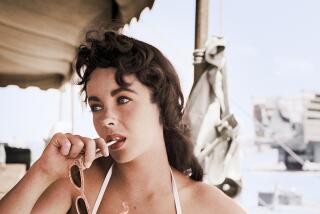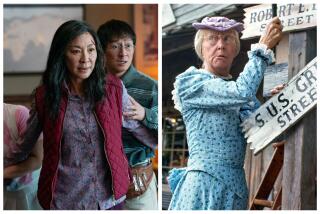Grace Befitting a True Screen Goddess
- Share via
Loretta Young, who died Saturday at age 87, defied the years better than any actress I can think of. At a very elegant party in Malibu honoring Rudolf Nureyev and Margot Fonteyn several years ago, Loretta arrived in what seemed a motorcyclist’s outfit, except that it was of black sateen, clinging to a form that cannot have changed substantially since she was in her teens. It and she were gorgeous.
Nureyev, who caught sight of her as she walked in, slipped upstairs and returned in his own black motorcyclist’s outfit, paying homage to a beautiful woman.
Robert Mitchum remembered once when he was shooting “Rachel and the Stranger” with Young in 1948, how at one point she was checking all the lights, and instructing the crew on how to tweak them to enhance her undeniable beauty. Mitchum stood in the shadows, watching her perfectionist zeal with amusement. She became aware of his gaze and said, “Look at you, Mitchum, you don’t worry about any of this,” with a kind of amused exasperation, “and you’ve been working in everybody else’s spill light [the light principally aimed at the other actors] for years, and yet here you are a star.”
But so, of course, was Loretta Young, one of the last of a generation who could trace her origins to walk-ons in silent films, then to a slightly larger part that enabled director Mervyn LeRoy and audiences to discover her real potential. In quick time she had arrived at the sure and certain knowledge that she was a bona fide star.
“We had faces then,” that unforgettable line from “Sunset Boulevard,” almost said it all--but not quite. Those who came to stardom in Loretta Young’s generation had poise and grace, and were as near to goddess stature as mortals were likely to achieve in modern times.
At that, as Young’s passing makes clear to those whose memories reach to the day before yesterday, there was only a relatively brief time in the whole life of the movies when fame conveyed that kind of god- and goddesslike status. Television fetched the would-be heavenly creatures down to earth and into the living room. (Jack Paar went further and said his was the only show people watched through their toes.)
It may be that the people who remember Young’s Oscar-winning performance in “The Farmer’s Daughter” in 1947 are outnumbered by those who remember her eight years as hostess of the dramatic anthology “The Loretta Young Show.” Her twirling entrance each week in a gown more glamorous than the one the week before became an item of parody for comediennes, but the audience loved it. For a few bright seasons, she brought to television that dignity, charm and beauty she had brought to the movies before television changed the world.
It needs no saying that she was a fine and versatile actress. Those who triumphed in the golden age of Hollywood indeed had faces, but they had artistry and skills to match, including knowing where to aim the lights.
More to Read
Only good movies
Get the Indie Focus newsletter, Mark Olsen's weekly guide to the world of cinema.
You may occasionally receive promotional content from the Los Angeles Times.






